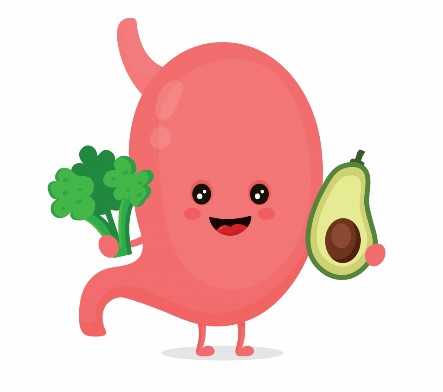Maintaining the health of the digestive system
Maintaining the health of the digestive system is an important thing to do, so how do we maintain the health of the digestive system?
Here is a group of advice that we have collected specifically for you, which will help protect the digestive system from various health problems:
Diet plays an important role in maintaining your digestive health, so you should start with your diet, for example;
1- Yogurt:
Yogurt is made from fermented milk, usually by lactic acid bacteria.
It contains friendly bacteria known as probiotics, which are good bacteria that live in your digestive tract and can help improve digestion. (1)
Probiotics can help with digestive issues, such as bloating, constipation, and diarrhea. (1)
Probiotics naturally occur in your gut, you should boost your intake of food like yogurt or supplements that can ease your digestion. (1)
2- Chia Seeds:
Chia seeds are a source of fiber. They work like a prebiotic, supporting the growth of healthy bacteria in your gut and improving your healthy digestion.
Their fiber content also helps promote bowel regularity and healthy stools.(1)
3- Whole Grains:
Whole grains like oats and quinoa can improve your digestion as fiber helps add bulk to your stool and can reduce constipation, and some grain fibers act like prebiotics that help feed healthy bacteria in your gut. (2)
4- Salmon:
Salmon is an excellent source of Omega-3. Omega-3s found in salmon, decreases inflammation in your gut, thus improving your digestive process. (3)
5- Peppermint:
Peppermint and peppermint oil can decrease symptoms of IBS; including bloating, stomach discomfort and bowel movement issues. (4,5)
6- Apple:
Apple is a rich source of pectin (soluble fiber). It will help you resolve constipation and diarrhea. (1)
Now that we have outlined recommended food for improving digestive health, here are the some diets and food you should avoid:
1- Acidic food:
Tomato sauce and citrus fruits, such as lemons, limes, oranges, and grapefruit, are acidic and can irritate the stomach lining, causing digestive problems. (6)
High acidic food and drink:(7)
- certain dairy products, including cheese
- processed meats, such as corned beef and turkey
- carbonated beverages, such as soda
- high protein foods and supplements with animal protein
2- Dairy products:
Dairy products can be hard to digest for some people, mainly because of lactose. This case is called lactose intolerance.
What is lactose intolerance? (8)
Lactose is a type of sugar that occurs naturally in the milk of most mammals.
Within humans exists an enzyme called lactase, which is the enzyme that breaks down and digests lactose. The majority of people lack the proper enzyme to digest lactose, making them lactose intolerant.
It may still be okay to eat yogurt and lactose-free milk.
The signs and symptoms of lactose intolerance usually begin from 30 minutes to two hours after eating or drinking foods that contain lactose.
Symptoms of lactose intolerance:
- Diarrhea
- Nausea, and sometimes, vomiting
- Stomach cramps
- Bloating
- Gas
When to see a doctor:
Make an appointment with your doctor if you frequently have symptoms of lactose intolerance after eating dairy foods, particularly if you're worried about getting enough calcium.
3- Fatty foods:
Fatty foods stimulate contractions in the digestive tract, which can slow down the emptying of the stomach and worsen constipation or speed up movement, leading to or worsening diarrhea (9).
You should put low-fat foods on the menu and eat small meals spaced throughout the day, which can put less pressure on your stomach. Avoid high-fat food, like butter, ice cream, red meat, and cheese.
You can get your fat needs from healthy fat sources.
Foods that contain healthy fats:(10)
- Avocado
- Dark chocolate
- Whole eggs
- Salmon
- Raw nuts
- Chia seeds
- Extra virgin olive oil
- Yogurt
4- Fried food:
The problem with fried food is the same as with fatty foods. Fried foods are low in fiber and take time to digest, so they slow down the digestive process. (9)
5- Processed food:
Processed food should be generally avoided in all cases but specifically, if you have chronic constipation because it contains preservatives, artificial colors, lactose, and is low in fiber. (11)
Some examples of processed foods include:(11)
- frozen or ready meals
- baked goods, including pizza, cakes, and pastries
- packaged bread
- processed cheese products
- breakfast cereals
- crackers and chips
- candy and ice cream
- instant noodles and soups
- reconstituted meats, such as sausages, nuggets, and fish fingers
- sodas and other sweetened drinks
6-Artificial sweetener:
The artificial sweetener that causes digestive problems is Sorbitol. (9)
Sorbitol has a different name on food labels like D-sorbitol, 50-70-4, E420, and D-glucitol.
So If you have diarrhea, read food labels so that you can avoid Sorbitol.
Processed food products that contain Sorbitol:
- sugar-free candies for those with diabetes
- sugar-free chewing gum
- sugar-free jams and marmalades
Sorbitol can also be found in the juice forms of the high sorbitol fruits such as pear juice and plum juice. Be sure to check the label carefully for such ingredients in food products such as pre-prepared smoothies, trail mixes, cereals, and sauces. (12)
7- Caffeine:
Coffee stimulates gastrin release and gastric acid secretion, leading to heartburn and GERD. Excessive amounts of caffeine can give anyone diarrhea. It’s not recommended to switch to decaf coffee because it still has some caffeine. So if you have heartburn or any digestive problems, try to control coffee, chocolate, soda, and energy drinks. (13,14)
8- Spicy food:
Spicy foods can trigger abdominal pain. For people with inflammatory bowel disease (or IBD — Crohn’s disease or ulcerative colitis), spicy foods can also trigger some symptoms. (15)
If you are suffering from IBS, there are a few tips to deal with IBS:
- Avoid foods that trigger your symptoms
- Eat high-fiber foods
- Drink plenty of fluids
- Exercise regularly
- Get enough sleep
Are you aware of gluten intolerance?
Do you know what gluten is?
Gluten is a family of proteins found in grains, including wheat, rye, spelled, and barley. Wheat is the most common grain that contains gluten. (16) When flour mixes with water, the gluten proteins form a sticky network that has a glue-like consistency. This glue-like property makes the dough elastic and gives bread the ability to rise during baking. It also provides a chewy, satisfying texture. (16) People may experience the following symptoms for several hours or days after they consume gluten:(17)
- Abdominal pain.
- Anemia.
- Anxiety.
- Bloating or gas.
- Brain fog or trouble concentrating.
- Depression.
- Diarrhea or constipation.
- Fatigue.
- Headache.
- Joint pain.
- Nausea and vomiting.
- Skin rash.
- Many people with gluten intolerance also have irritable bowel syndrome (IBS).
Probiotics help increase the good bacteria in your gut. They may reduce symptoms of bloating, gas or constipation.Foods high in gluten that you should avoid:(18)
- wheat
- rye
- barley
- bread
- pasta
- cereals
- beer
- cakes, cookies, and pastries
Gluten-free grains that should be in your diet:(18)
- rice
- oats
- quinoa
- flax
- millet
- sorghum
- arrowroot
- amaranth
Gluten-free foods:(18)
- meat
- fish and seafood
- eggs
- dairy products
- fruits
- vegetables
- legumes
- nuts
- tubers
- fats, such as oils and butter
A person should always consult with a healthcare professional before adopting a gluten-free diet.
When to Seek Emergency Care
Severe abdominal pain should never be ignored. Go to your nearest emergency room or call 998 if you have any of these symptoms:(19)
- Persistent nausea and vomiting
- Pain accompanied by the inability to have a bowel movement (especially if you are vomiting)
- Abdominal pain while vomiting blood
- Profuse or continual bleeding from the bowels
- Gastric pain accompanied by shortness of breath or difficulty breathing
- Pain that is severe and sudden
- Severe tenderness when you touch your abdomen
- Skin that appears yellow
- Swelling of the abdomen
- Pain during pregnancy (or if you suspect you are pregnant)

References
- The 19 Best Foods to Improve Digestion [Internet]. [cited 2022 Feb 14]. Available from: https://www.healthline.com/nutrition/best-foods-for-digestion#TOC_TITLE_HDR_3
- The Whole Truth About Whole Grains [Internet]. [cited 2022 Feb 14]. Available from: https://www.webmd.com/food-recipes/features/the-whole-truth-about-whole-grains
- Is Salmon Easy To Digest? The Definitive Guide - Foods Fact [Internet]. [cited 2022 Feb 14]. Available from: https://www.foodsfact.org/is-salmon-easy-to-digest/
- Sinagra E, Pompei G, Tomasello G, Cappello F, Morreale GC, Amvrosiadis G, et al. Inflammation in irritable bowel syndrome: Myth or new treatment target? World Journal of Gastroenterology [Internet]. 2016 Feb 21 [cited 2022 Feb 14];22(7):2242. Available from: /pmc/articles/PMC4734999/
- Cash BD, Epstein MS, Shah SM. A Novel Delivery System of Peppermint Oil Is an Effective Therapy for Irritable Bowel Syndrome Symptoms. Digestive diseases and sciences [Internet]. 2016 Feb 1 [cited 2022 Feb 14];61(2):560–71. Available from: https://pubmed.ncbi.nlm.nih.gov/26319955/
- Are acidic foods harmful to health? [Internet]. [cited 2022 Feb 14]. Available from: https://www.medicalnewstoday.com/articles/322557#the-acid-ash-hypothesis
- Acidic Foods: What You Need to Know [Internet]. [cited 2022 Feb 14]. Available from: https://www.webmd.com/diet/what-to-know-about-acidic-foods#091e9c5e8218ec9d-2-5
- di Costanzo M, Berni Canani R. Lactose Intolerance: Common Misunderstandings. Annals of Nutrition and Metabolism [Internet]. 2019 Feb 1 [cited 2022 Feb 14];73(Suppl 4):30–7. Available from: https://www.mayoclinic.org/diseases-conditions/lactose-intolerance/symptoms-causes/syc-20374232
- 11 Foods to Avoid During Digestive Problems and Disorders | Everyday Health [Internet]. [cited 2022 Feb 14]. Available from: https://www.everydayhealth.com/digestive-health/diet/foods-to-avoid-during-digestive-problems/
- 9 High-Fat Foods That Are Actually Super Healthy [Internet]. [cited 2022 Feb 14]. Available from: https://www.healthline.com/nutrition/10-super-healthy-high-fat-foods#TOC_TITLE_HDR_4
- Processed foods: Health risks and what to avoid [Internet]. [cited 2022 Feb 14]. Available from: https://www.medicalnewstoday.com/articles/318630#what-is-processed-food
- Sorbitol intolerance: an unappreciated cause of functional gastrointestinal complaints - PubMed [Internet]. [cited 2022 Feb 14]. Available from: https://pubmed.ncbi.nlm.nih.gov/6847853/
- Coffee and gastrointestinal function: facts and fiction. A review - PubMed [Internet]. [cited 2022 Feb 14]. Available from: https://pubmed.ncbi.nlm.nih.gov/10499460/
- Boekema PJ, Samsom M, van Berge Henegouwen GP, Smout AJPM. Coffee and gastrointestinal function: facts and fiction. A review. Scandinavian journal of gastroenterology Supplement [Internet]. 1999 [cited 2022 Feb 14];230(34):35–9. Available from: https://pubmed.ncbi.nlm.nih.gov/10499460/
- A hot topic: Are spicy foods healthy or dangerous? - UChicago Medicine [Internet]. [cited 2022 Feb 14]. Available from: https://www.uchicagomedicine.org/forefront/health-and-wellness-articles/spicy-foods-healthy-or-dangerous
- Biesiekierski JR. What is gluten? Journal of Gastroenterology and Hepatology (Australia). 2017 Mar 1;32:78–81.
- Gluten Intolerance: Symptoms, Test, Non-Celiac Gluten Sensitivity [Internet]. [cited 2022 Feb 14]. Available from: https://my.clevelandclinic.org/health/diseases/21622-gluten-intolerance
- Gluten: What is it, gluten-free diet, intolerance, and sensitivity [Internet]. [cited 2022 Feb 14]. Available from: https://www.medicalnewstoday.com/articles/318606#gluten-free-diet
- When to See a Healthcare Provider for Abdominal Pain [Internet]. [cited 2022 Feb 14]. Available from: https://www.verywellhealth.com/when-to-see-a-doctor-for-abdominal-pain-770762
